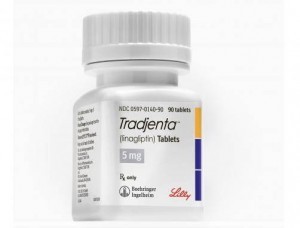 A Phase III investigation of linagliptin (trade name Trajenta® in Europe) that lasted 102 weeks has shown significantly lowered blood glucose levels in adults who have been diagnosed with Type 2 diabetes. The results of the study were presented at the 47th yearly meeting of the European Association for the Study of Diabetes (EASD) by Boehringer Ingelheim and Eli Lilly and Company. The findings demonstrated that linagliptin, a DPP-4 inhibitor, showed a positive safety profile in addition to reducing HbA1c levels by 0.8% over a long term period in patients who were treated with the medication for the entire duration of the study.
A Phase III investigation of linagliptin (trade name Trajenta® in Europe) that lasted 102 weeks has shown significantly lowered blood glucose levels in adults who have been diagnosed with Type 2 diabetes. The results of the study were presented at the 47th yearly meeting of the European Association for the Study of Diabetes (EASD) by Boehringer Ingelheim and Eli Lilly and Company. The findings demonstrated that linagliptin, a DPP-4 inhibitor, showed a positive safety profile in addition to reducing HbA1c levels by 0.8% over a long term period in patients who were treated with the medication for the entire duration of the study.
The results showed not only the effectiveness of linagliptin, but its usefulness in the long term. “These results show that the efficacy achieved by linagliptin is reliable and meaningful in a clinical setting, but also that it is durable over the long term,” said Professor David Owens, Clinical Professor with the Department of Medicine at the Cardiff University School of Medicine in Wales, U.K. “This is especially important in chronic conditions such as type 2 diabetes.”
The data provided by the study demonstrates the effectiveness of linagliptin as well as the patients’ ability to tolerate it as a medication for Type 2 diabetes over a period of 102 weeks. Linagliptin was tested as a treatment by itself, as a dual treatment with metformin or pioglitazone, or as part of a multiple medication treatment along with metformin and sulphonylurea. After 24 weeks of blinded treatment, patients showed a reduction in HbA1c level of 0.8%; those results were durable, lasting throughout the remaining 78 weeks of the investigation. On average, the participants experienced a low incidence of hypoglycemic events while their body weight stayed about the same.
A separate investigation lasting 12 weeks demonstrated linagliptin’s effectiveness and durability when used as a dual medication in combination with metformin. The test used a group of patients who had been diagnosed with Type 2 diabetes and were taking uncontrolled metformin twice daily, a dose of 1500mg per day. The group was further split into two separate groups; one group took linagliptin 2.5mg twice daily — to simplify dosing, as the patients were already taking metformin twice daily — while the other group received linagliptin 5mg approved doses once daily. After adjusting for placebo, the results indicated that the two groups showed a comparable reduction in HbA1c, at 0.74% for the group taking linagliptin twice daily and 0.8% for the group taking the medication once daily.
“Linagliptin is a new treatment that is primarily excreted unmetabolised via the bile and gut, and so delivers reliable HbA1c reductions at one dosage strength for all patients, even for those with declining hepatic or renal function,” said Professor Anthony Barnett, a consultant physician with the Heart of England NHS Foundation Trust as well as Emeritus Professor of Medicine at the University of Birmingham in the U.K. “One dosage strength for all patients will help make the process of prescribing easier and more straightforward for physicians.”
The findings of the investigation demonstrate meaningful effectiveness of linagliptin, with good safety and tolerability markers, across patients with all types of Type 2 diabetes — from those who have been newly diagnosed with the disease to those with significant renal impairment.
Linagliptin was developed by Boehringer Ingelheim and is being marketed by Eli Lilly. Linagliptin inhibits DPP-4, an enzyme that degrades glucagon-like peptide 1 (GLP-1) and glucose-dependent insulinotropic polypeptide (GIP).